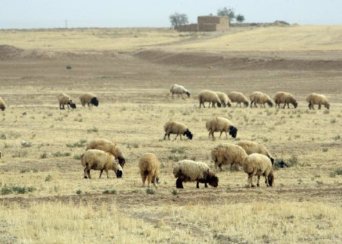- About
- Topics
- Picks
- Audio
- Story
- In-Depth
- Opinion
- News
- Donate
- Signup for our newsletterOur Editors' Best Picks.Send
Read, Debate: Engage.
By now we have to consider climate change as a serious factor to cause wars on our planet. And, we need to understand that the devastating civil war in Syria may be one of its first cases, says Eric Holthaus from Slate, referring to a study published in the Proceedings of the National Academies of Science: "It provides the clearest evidence yet that human-induced global warming made that drought more likely. The study is the first to examine the drought-to-war narrative in quantitative detail in any country, ultimately linking it to climate change."
Holthaus explains how various factors influenced the course of Syria in a fatal way: "From 2006-2010, an unprecedented drought forced the country from a groundwater-intensive breadbasket of the region to a net food importer. Farmers abandoned their homes—school enrollment in some areas plummeted 80 percent—and flooded Syria’s cities, which were already struggling to sustain an influx of more than 1 million refugees from the conflict in neighboring Iraq. The Syrian government largely ignored these warning signs, helping sow discontent that ultimately spawned violent protests. A preventable drought-triggered humanitarian crisis sparked the 2011 civil war, and eventually, ISIS."
According to the study Syria had been conducting poor governance and unsustainable agricultural and environmental policies. The drought had a catalytic effect, and thus contributed to political unrest.
In an interview with Holthaus, David Titley, a meteorologist at Penn State University, considers Syria's case a "pretty convincing climate fingerprint. After decades of poor water policy, there was no resilience left in the system, and so the drought caused Syria to break catastrophically.”
Our dossier illustrates in that context why access to water is so crucial to enable peaceful human existence.
More on this topic also in the New York Times.
Image: Getty / Slate
